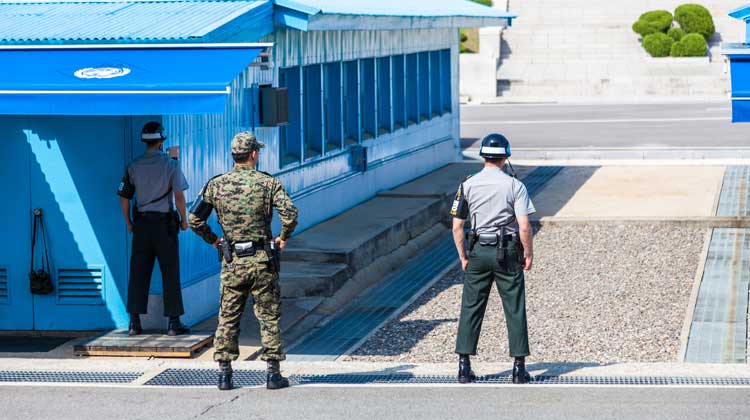 Heritage Foundation Senior Research Fellow Bruce Klingner warned against a premature peace declaration with North Korea in an issue brief published Sept. 18. He added that North Korea should show verifiable commitment to ending its nuclear ambitions before a second summit between North Korea and the United States.
Heritage Foundation Senior Research Fellow Bruce Klingner warned against a premature peace declaration with North Korea in an issue brief published Sept. 18. He added that North Korea should show verifiable commitment to ending its nuclear ambitions before a second summit between North Korea and the United States.
“A peace declaration would be a historic but meaningless feel-good gesture that had no tangible benefits and did nothing to improve the security situation on the Korean Peninsula,” Klingner wrote. “It would not reduce the North Korean military threat to the allies or alleviate distrust and suspicion.”
He added that it “would only provide amorphous hope” of better relations with few tangible results.
Klingner emphasized that it is most important to clearly define terms of any agreement backed by specific requirements and a process of iron-clad verification.
“Secretary of State Mike Pompeo’s meetings with North Korean counterparts have failed to bridge the chasm between the U.S. and North Korean negotiating positions,” Klingner wrote, adding that Pompeo’s cancelled trip to the North Korean capitol in August after receiving harsh criticism from North Korea, and the regime’s preference to deal with President Donald Trump directly. “By praising Trump personally, Kim Jong-un seeks additional concessions from the president, whom the regime sees as more eager to maintain the proclaimed success of the summit.”
Additional concerns are nearby actors China and South Korea. China is eager to have reduced tensions in the region and could support a peace declaration, Klingner noted. And he’s particularly concerned about South Korea’s “enthusiastic advocacy” of a path that reflects support for some of the North’s efforts.
“The South Korean Proposal shares characteristics with North Korean pronouncements in placing denuclearization after a series of allied concessions,” Klingner wrote, adding that the South is downplaying concerns about such an agreement.
“[A]dvocates have yet to identify any tangible benefits to signing a peace declaration, neither a specific quid pro quo that the regime will provide nor the expected change in North Korean policy or behavior resulting from the regime feeling ‘less threatened’,” Klingner wrote.
He suggests that in the case of a second summit, the United States should establish conditions for an actual peace treaty that includes a denuclearization progress as well as a reduction of North Korea’s conventional threat to the South.
Klingner also emphasized that such a treaty with the North be independent of treaties and defense agreements the United States has with its allies in the region.
Among other recommendations are the requirements that United States receive data on North Korea’s nuclear and other offensive programs, including agreements for facilities inspections to verify the treaty’s progress.
“The U.S. Should not forget that the armistice that Pyongyang and Seoul are so eager to replace was necessitated by North Korea’s invasion of the South in 1950,” Klingner wrote. “The source of tensions is not an armistice versus a peace declaration, but rather North Korea’s post-war actions.”
Read the entire brief here.
© 2018 Homeland411
Please subscribe to our weekly electronic newsletter.